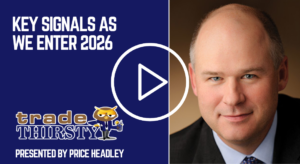Mistakes sabotage every area of our lives, and trading is no exception. The good news is that we learn from our mistakes. In fact, seeing mistakes as learning opportunities is the popular approach to viewing human error, and with good reason since they provide learning lessons aplenty, albeit often excruciatingly painful ones both in the psyche and the bank account. In over 3 decades of trading, I have probably seen every trading mistake possible, and I’ve even made most of them.
As in life, mistakes seem to recur until we own them and modify, at which time we overcome that particular error and move on to the next. The good news is that you can learn by observing and studying the behaviors and habits of successful traders who have already been in the trenches and learned from their mistakes. This practice can shave years off of a trader’s learning curve. It’s all about adopting the powerful actions and attitudes of successful traders.
There is no perfect trader or perfect system but in order to become a consistently good trader you must constantly be observing not only the markets, but also other experienced traders to gain knowledge and wisdom. It’s a never ending journey, like most valuable pursuits, but it can be an extremely rewarding one, both personally and financially.
When you model top trader’s actions, you make more money. It’s that simple. They’ve figured it out from years of experience, and you learn from them how to make more money in much less time. In this article, I’ll review some of those lessons that can be overcome from modeling consistently successful traders, most of which cost nothing.
- Consistently getting in or out of trades too soon…or too late
The culprit behind this common error is trading from fear or greed instead of following a chosen strategy. In trading it’s not always about trading the right option, the best model, or the perfect entry; it’s way bigger than that. If your attitude is not right, and your trading related actions aren’t right, then even the best technicals can’t help generate profitable trading results.
Studies show that 60% to 80% of trading success comes from a trader’s mental and emotional state. Great traders are always working to keep their emotions out of their trading. By developing a state of detachment when trading, you can neutralize those emotions that can otherwise control your trading actions.
- Being a lone ranger
Everyone knows that the nature of trading is to go it alone. Trading attracts the introverted analytical thinker who generally thrives on hours of uninterrupted time to completely focus on the next great trade or indicator. The focus time can be beneficial, but the lack of accountability and team camaraderie is not. Being someone who has spent decades in the enthusiasm of a live trading room, complete with both shared cursing and celebrations, I can say that camaraderie is real, and it’s an asset. The value of camaraderie explains the proliferation of virtual trading rooms over the past few years, and my drive to have created one of the first.
- No plan for success or goals
Have you ever noticed how easy it is to jump into a trade that is outside of your trading plan? A plan encourages self-discipline and accountability. A good plan includes the following features.
- Capital allocated to trading
- Defined risk reward
- Time frame for holding trades
- Working hours
- Parameters around paper vs. real trading
- Structured time for accounting and review
- Tested model or system
Start with a plan and stick to it. Review it often and adapt it as you learn and improve.
- Trading a model that doesn’t work
Time and expense are usually the perpetrator with this costly saboteur. The perfect analogy is buying something that doesn’t work when you’ve gone shopping just so you haven’t wasted your time. The trader thinks about how long it took to learn the system, or the investment, often in the thousands, that was made to purchase the model. The solution is to buy a proven system from a demonstrated expert, and get the support to correctly learn and implement the model swiftly.
- Not thoroughly reviewing trades and accompanying charts
Let’s face it; it’s much more enticing to trade than to review trades, but the reality is that successful trading comes from reviewing what you did that worked, and doing more of it. It’s that simple. Without consistent time dedicated for review, this can’t be done.
Take time to review each trade; this is your money, and your business. Write the answers to the following questions in a log:
What worked?
What didn’t work?
What were the indicators doing?
What time of day was the trade made?
Why was the trade placed?
Why was the trade exited?
Could a slight tweak have made the trade more profitable?
- Not accounting for trades
Have you ever known a trader that likes to do accounting? Traders love the excitement of the trade, but hate the boredom of all the surrounding responsibilities, such as accounting, taxation and documentation. Boredom, avoidance of responsibility and denial are the backing behind this common slipup. It’s a lot easier to think about that great winning trade you made than to look at hard after commission numbers. Numbers don’t lie, but they are a strong teacher for how to improve results because they allow you to see what’s working and do more of it.
The solution is to schedule time for accounting. It’s so easy now with downloads from most brokers. With zero costs, you’ll then have the numbers to reveal the most potent answers you can get to improve your trading results.
- Delay in setting up your trading platform for maximum potential or using an inferior trading platform
There’s no denying that it can be time consuming to master a new trading platform. Traders will sometimes stay with a broker for years to avoid learning a new and better platform. This procrastination is costly and damaging to a trader’s success. There are a few remarkable trading platforms that are free just for doing business with that broker waiting to be capitalized upon. There is no excuse for not using a top notch platform. Many trading programs offer coaching on setting up their favorite platforms which can save time and frustration.
- Lack of goal setting
As Peter Drucker said “What gets measured gets done”. This paradigm is a step above accounting and review. Goal setting is about taking the big picture view of your overall life and money. Take this a step further and think about what your life will be like upon achieving those results.
Define what you want to make from your trading business. Review it often. As Drucker said, measure your results, and then compare them to your goals. This motivating habit drives you to do the mundane, like to accounting. It drives you to show up to trade when you want to play golf instead on that perfectly beautiful day.
- Trading with the emotions of fear and greed
Trading emotions could be an entire book, and it often is; your beliefs about money go all the way back to your childhood. What was happening in your childhood home around money? Was there never enough? Were you taught to manage money? Was there predominantly fear or greed? As woo woo as this sounds, taking a few minutes to think about this unseen force can quickly and easily help you spot those same patterns in your trading.
The way successful traders overcome this powerful saboteur is by trading from a plan, which allows complete detachment. A simple exercise to discern whether emotions affect your trading is to paper trade for a few days. Notice if the results are different from real trading. Of course, live trading can provide slightly different results due to the actual fill; take this into consideration, account for it and try to see how differently your trading results are when real money is not changing hands vs. when it is. This easy little application can reveal powerful insights about how your emotions may be hurting your profits.
Another clue is to notice how you feel when you trade. Does your heart race when you place a trade? Are you unable to leave your charts beyond the time designated in your trading plan? These are signs of emotional trading. Some of the best traders in my virtual trading room have consistently exited the room promptly at 9:30 daily. They are done, based on their trading plan. It’s unemotional and detached.
Fear causes traders to miss out on winning trades, or close trades before the optimum exit. Greed causes traders to stay in trades beyond their planned exit, or to take trades outside of their plan. Emotions exhaust traders.
First, recognize your money patterns and own them. Choose to not allow someone else’s past issues affect your trading results. Again, the crucial key is to detach emotionally from your trading. The best way to detach is to trade from a well thought out plan.
As you read this article, which points made you squirm the most? The most uncomfortable points will be the first area to focus to improve your trading results. Discomfort signals denial or expansion. The great thing is that most of the points above are absolutely free. That’s a risk reward you don’t see often in the trading world. I’ll take it.
Larry Gaines
PowerCycleTrading.com




